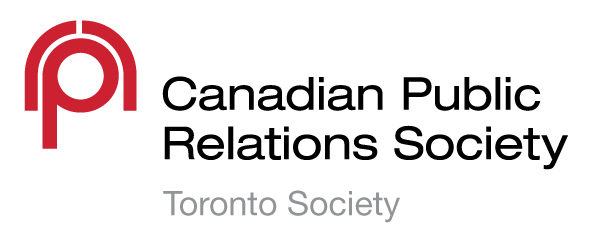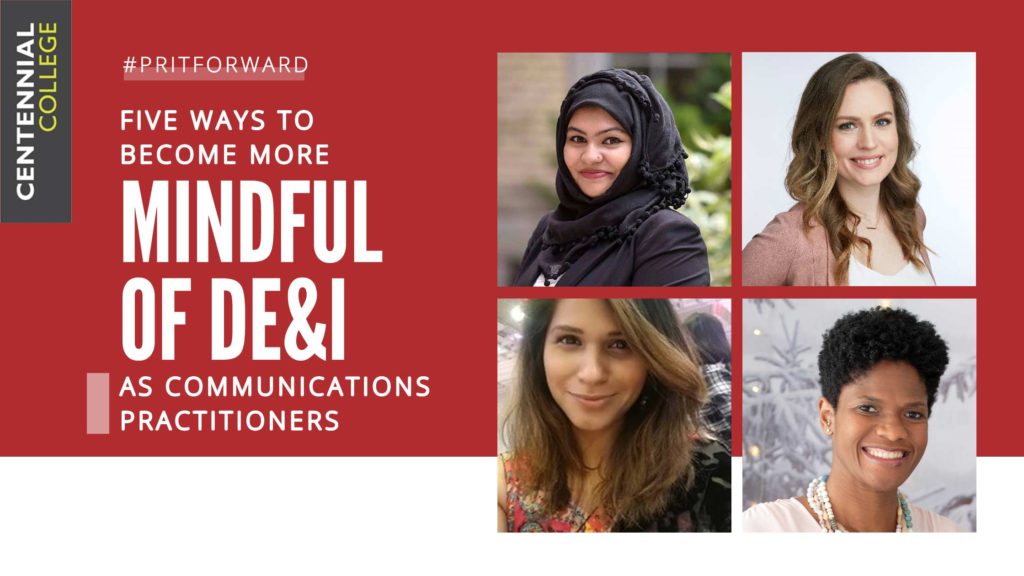Written by: Sarah Heiman, Rebecca Moe, Daisy Johanna Uy and Charmaine Blair, CCPR postgraduate students, Centennial College
Today’s powerful zeitgeist is around social responsibility and collective action. With the public’s demand of representation in the workplace and the work that we do, communicators are driven to contribute to the work of diversity, equity and inclusion (DE&I) in our industry.
We PR students talked to Fatyma Khan, Meghann Cox, Jeannette Holder and Mubashira Farooqi, four Toronto-based communicators from different sectors, about this critical issue. Here are just a few of the things we learned from them:
1. Put yourself out there.
Meet people outside your normal circle. Mubashira shared this realization: “If I don’t use my voice, how can I ask anyone else to?” How can we expect people to engage when we don’t engage ourselves? Putting ourselves out there encourages others to do so too.
2. If you see something, say something.
As communicators, we have our ears to the ground so we can do effective work. That means we can prompt colleagues and people in power when acceptance is missing. Fatyma says we can “nudge executives and remind them that, ‘Hey, there’s a little imbalance here. Do you notice that imbalance? Here are the things that you can do…’”
Often, something continues in the industry because it’s familiar and it’s the way it’s always been done. This doesn’t mean it needs to repeat though, and we can help the learning process of diversity along with these simple nudges.
3. Small actions can create ripples of influence.
Some actions may seem small; some initiatives may not feel noteworthy. Reframing those actions as the start of meaningful progress is a reminder that every step is a contribution. Be it a scholarship or a wider campaign, taking those tiny steps often snowball into meaningful work that can influence the industry.
4. Recognize that no two people have had the same life experiences.
Fatyma reminds us that, “representation helps us identify that no one person has lived the same life or had the same life experiences, and there’s something to learn from each other.” When we take in different perspectives and stories and put ourselves out there in turn, we learn to be kinder with each other. That makes us more humane, and our work more interesting as well.
This realization also leads to significant interactions in the workplace, just like when Jeannette shared about PwC employees sharing their lived experiences.
5. Emotional intelligence is important especially in leadership roles.
We are increasingly seeing the role of emotion in effective leadership, particularly in uncertain times. Empathy, respect and concern for people go a long way towards creating connection with the people we work with and our audiences as well.
Today’s episode and our reflections show the beginnings of more acceptance in the PR industry, even as there’s space for work to be done. As forward-thinking communicators, we can be part of that change, helping shape the industry in the work that we do. You can listen to the full episode by clicking here.
The Future of PR Looks Like Us campaign
The Future of PR Looks Like Us is led by a team of Centennial College PR and corporate communications postgraduate students in partnership with the Canadian Council of Public Relations Firms (CCPRF). We intend to highlight the importance of diversity, equity and inclusion (DE&I) in the PR industry.
This blog accompanies a podcast series exploring diverse voices that influenced the industry and featuring work done by PR students from Centennial College. Learn about diverse figures of PR’s past who have shaped the industry for today’s BIPOC professionals. Listen in to uncover misconceptions and learn about the opportunities the industry holds. The series closes by highlighting the bright future PR professionals and students see as diversity grows within the industry.

